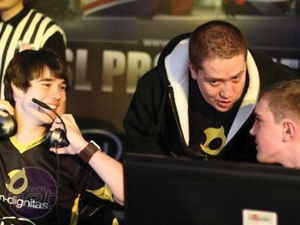Does Professional Gaming Have a Future?
April 10, 2009 | 09:29
Companies: #bit-tech #esports #world-cyber-games

The Importance of Management
What now happens within the community is the important factor – the way management is growing in importance, and the manner in which this management is developing existing talent and nurturing new players. UkeSA, for example, is investing heavily in management skills, training team managers in organisation, leadership, communication and financial management skills so that they can give their players the support they need and develop working businesses. Michael O’Dell explains, ‘It’s essential now for teams to have a dedicated manager. With a manager or, as with Team Dignitas, a dedicated management team, players can do what they need to do, which is train and then compete.’People forget sometimes that some of the UK’s finest players are very young. ‘These kids – most of them 18 or 19 years old – need someone who can look after them,’ comments O’Dell. 4Kings manager Ian Leckey agrees. ‘Managers in professional gaming are extremely important. We actively push for the team’s promotion, and work day and night to capture increased sponsorship to help with operational costs.’
 A better infrastructure gives team managers a chance to push eSports as a whole. ‘We try to help the community,’ Michael O’Dell explains. ‘We want to sponsor smaller teams and sponsor players to help get them going. It’s no good having two or three big UK teams – we need ten to 15 big teams who can compete against each other.’
A better infrastructure gives team managers a chance to push eSports as a whole. ‘We try to help the community,’ Michael O’Dell explains. ‘We want to sponsor smaller teams and sponsor players to help get them going. It’s no good having two or three big UK teams – we need ten to 15 big teams who can compete against each other.’In the end, management, not playing games, might be the more stable career. Managers might not make thousands of dollars in prize money, but they can earn a living. ‘As a player, this is difficult,’ says Ray Mia, ‘but as a manager, it’s feasible. It isn’t a massive income, but there are global competitions where – if you reach the top of your game – you’ll receive sponsorship and be able to make gaming a business. That model exists, and at UkeSA, we’re trying to promote an environment and a marketplace in which that can thrive.’
However, for the managers, it can also be a question not just of making a living, but of doing something they love. ‘Sometimes it’s left to a team captain to handle practice and training sessions,’ says Ian Leckey, ‘but I personally like to be involved on that front as much as possible, especially during the run-up to a big tournament where there’s a lot of money and pride at stake. Many team managers have already made this their full-time job, but there’s an lot of work to do before you can reap such rewards. It isn’t an easy job, but I love everything about it!’
‘I love the coaching,’ agrees O’Dell. ‘Every time my team competes in a big tournament it’s like my wife having a baby. Last year, we won one of our biggest tournaments and my team won half a million dollars.’ Fatal1ty might still be the eSports poster boy, but will it ever have a David Beckham or a Tiger Woods, who can reach out to the public at large? Ray Mia thinks so. ‘I believe that we’ll see a true eSports player who will rank as highly as a traditional sporting star; the world of advertising and marketing demands it. When you have such a huge audience around the world that’s interested in video gaming – and the demographics are growing every day – it’s only natural that people will eventually say, ‘Right, let’s make a David Beckham. Make no mistake: the next Lewis Hamilton will come from gaming.’
So is this logic or hopeless optimism? We’ll just have to wait and see.

MSI MPG Velox 100R Chassis Review
October 14 2021 | 15:04









Want to comment? Please log in.